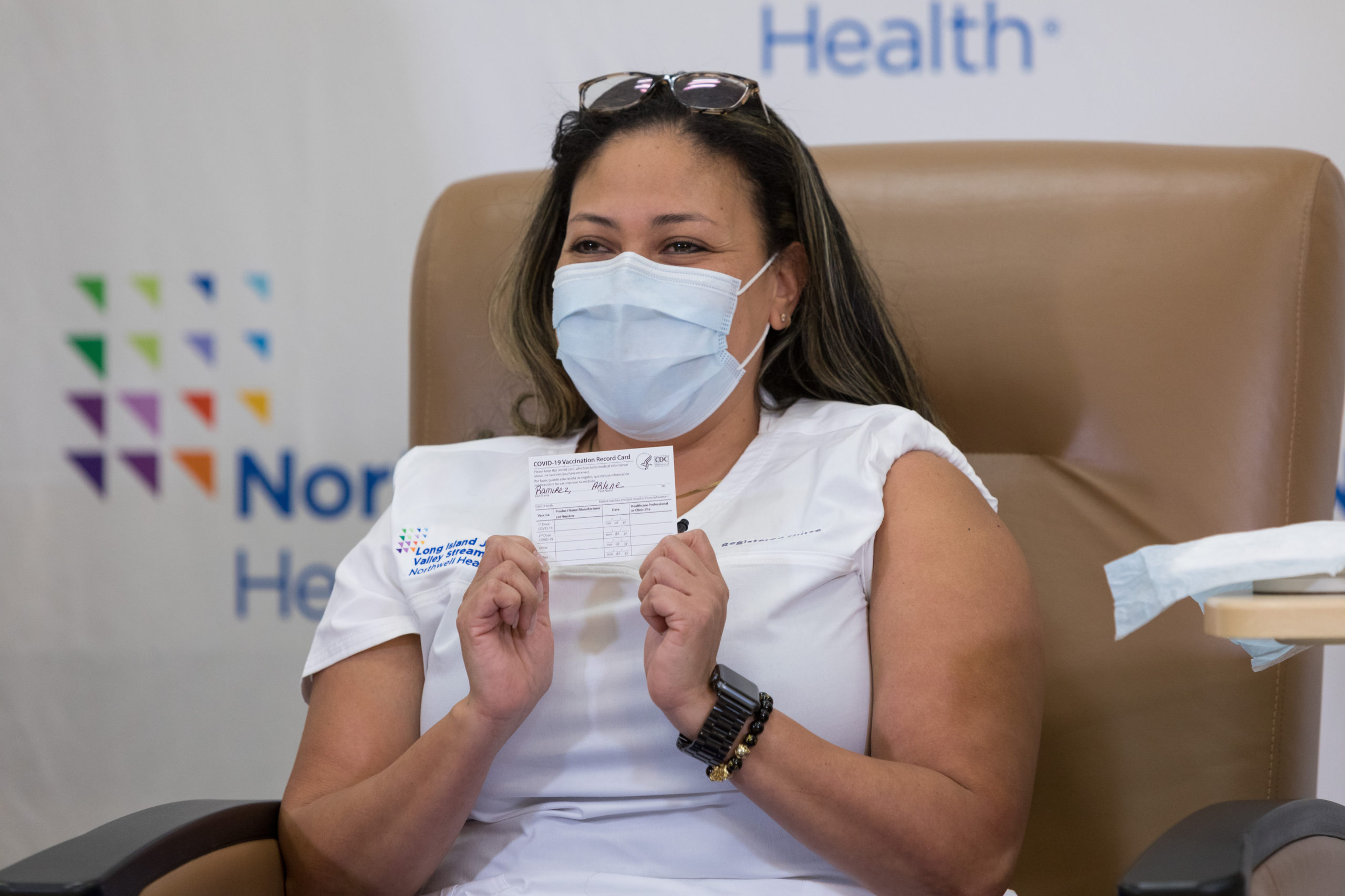Northwell Works to Overcome Vaccine Hesitancy in Black and Latinx Communities
A history of abuse towards Latinx and Black communities from the government and healthcare communities and a lack of diversity in medical studies have created a vaccine hesitancy.
To overcome the skepticism, Northwell is collaborating with local faith leaders, and their healthcare professionals of color are sharing their vaccination experiences to help build trust in these communities.
“No one wants to be vaccinated first. There’s a stark difference between how many community members wanted to be tested for COVID-19 and how many want to get their first vaccine shot,” said Rev. Barbara Felker, vice president of strategic community partnerships at Northwell Health.
Felker said community members are concerned about the lack of diversity among participants in clinical trials for the Moderna and Pfizer vaccines.
Another issue is the past medical abuses of people of color. The history of medical mistreatment of members of Black and Latinx communities in the U.S. goes back hundreds of years. Incidents in recent memory include the Tuskegee Experiment, which lasted from 1932 to 1972, and involved the deception of 600 Black men. The Public Health Service and the Tuskegee Institute misled approximately 400 men to believe they were being treated for syphilis. In reality, they were given no treatment at all.
Other incidents include multiple states secretly sterilizing Black women against their will and by force between the early 1900s and the 1960s. Medical centers in Puerto Rican sterilized Puerto Rican women by force between the 1930s and 1970s. In recent years, Immigration and Customs Enforcement (ICE) officers and the medical providers with which they have contracted have sterilized Latinx and other women of color by force and give people of color of all genders inadequate medical care.
“Further, there’s been a political cloud over the process of vaccine development. Many people believed the development process was unsafe. (They believe it) happened too quickly (and) with minimal participation of Black and Latinx (people) in the clinical trial studies,” She said.
Northwell is currently working to build trust through collaborative relationships with faith leaders and communities it provides care.
“Our intention is to increase access to care in communities that were disproportionately affected by COVID-19. We will continue the faith-based collaboration by providing COVID-19 testing and vaccines within houses of worship and community-based facilities,” said Rev. Felker.
Rev. Felker said faith leaders are comfortable because Northwell does not provide ICE or other federal agencies with patient information collected during COVID-19 vaccine distribution.
“That would be a HIPAA violation. We use an in-app chatbox, email, or texts to notify patients about test results and vaccine availability,” said Rev. Felker.
One of the reasons Northwell works with faith leaders is that they can do outreach beyond congregations.
Rev. Felker said through the pandemic, faith leaders have been communicating with their congregants and other members of the community via robocalls, social media, food pantry distribution, and in-house and virtual faith services.
Northwell helps faith leaders begin dialogues about vaccinations by providing them with talking points and answers to frequently asked questions.
“We are also in the process of developing a Northwell Health community website with video clips, animations, interviews, and articles in English, Spanish, and Haitian Creole. We are intentionally creating content that appeals to audiences of different age groups and populations,” said Rev. Felker.

The question of how New York City healthcare organizations can overcome vaccine hesitancy among people of color also occurs within hospitals and clinics, said Arlene Ramirez.
Ramirez is the director of patient care at the Emergency Department of Long Island Jewish Valley Stream Hospital. Ramirez was Northwell’s first healthcare professional to receive the first dose of the Moderna COVID-19 vaccine.
Ramirez said the fear of the vaccine among healthcare workers is widespread.
“We can overcome that by educating ourselves. We do that by creating and sharing informational resources, from links to Centers for Disease Control and Prevention websites to talk with staff who have gotten it and had positive experiences,” said Ramirez.
Ramirez said explanations from medical directors, infection control staff, and Northwell administrators during rounds on every floor have helped clear up uncertainty.
“Everything that allows a healthcare professional to separate their personal opinion from the facts is good. It’s important to admit we do not know all of the side effects,” said Ramirez.
Ramirez said the key statement to highlight is that the benefits outweigh the risks. She said leaders within the organization are demonstrating that by returning to work and remaining in good health.
Ramirez said on her first day back, she got stopped in the hallways and asked how she felt.
“After I got the shot, I told my colleagues I felt OK. I came back to work the next day. That’s when I saw 113 Northwell employees had signed up to get their first shot.
“In addition, family and friends checked in to see how I was doing. My experience showed me that when one person gets a shot, many people change their minds,” said Ramirez.
For more New York City technology business and culture news subscribe to our YouTube Channel and follow us on social media @NYCWired.




